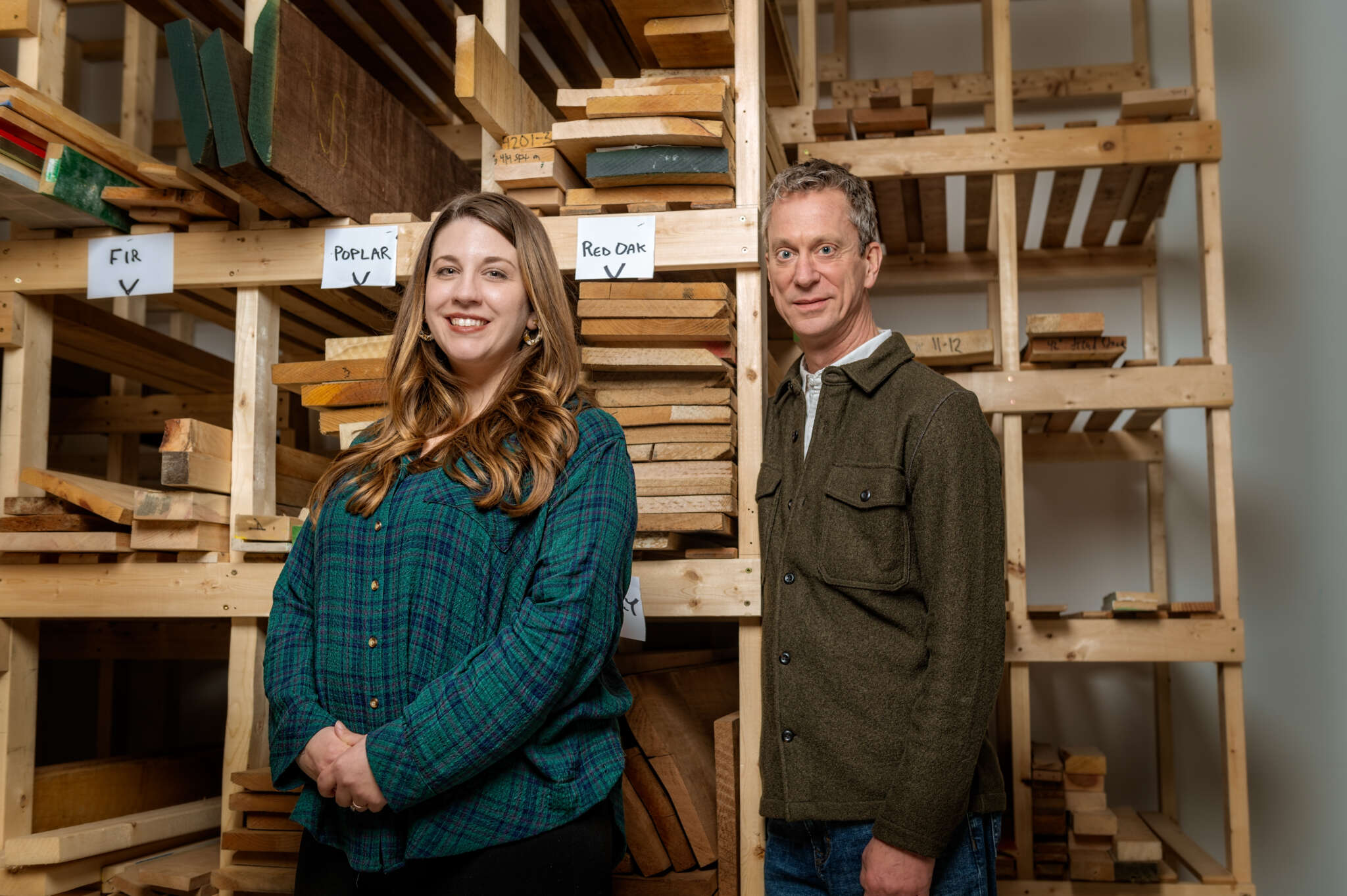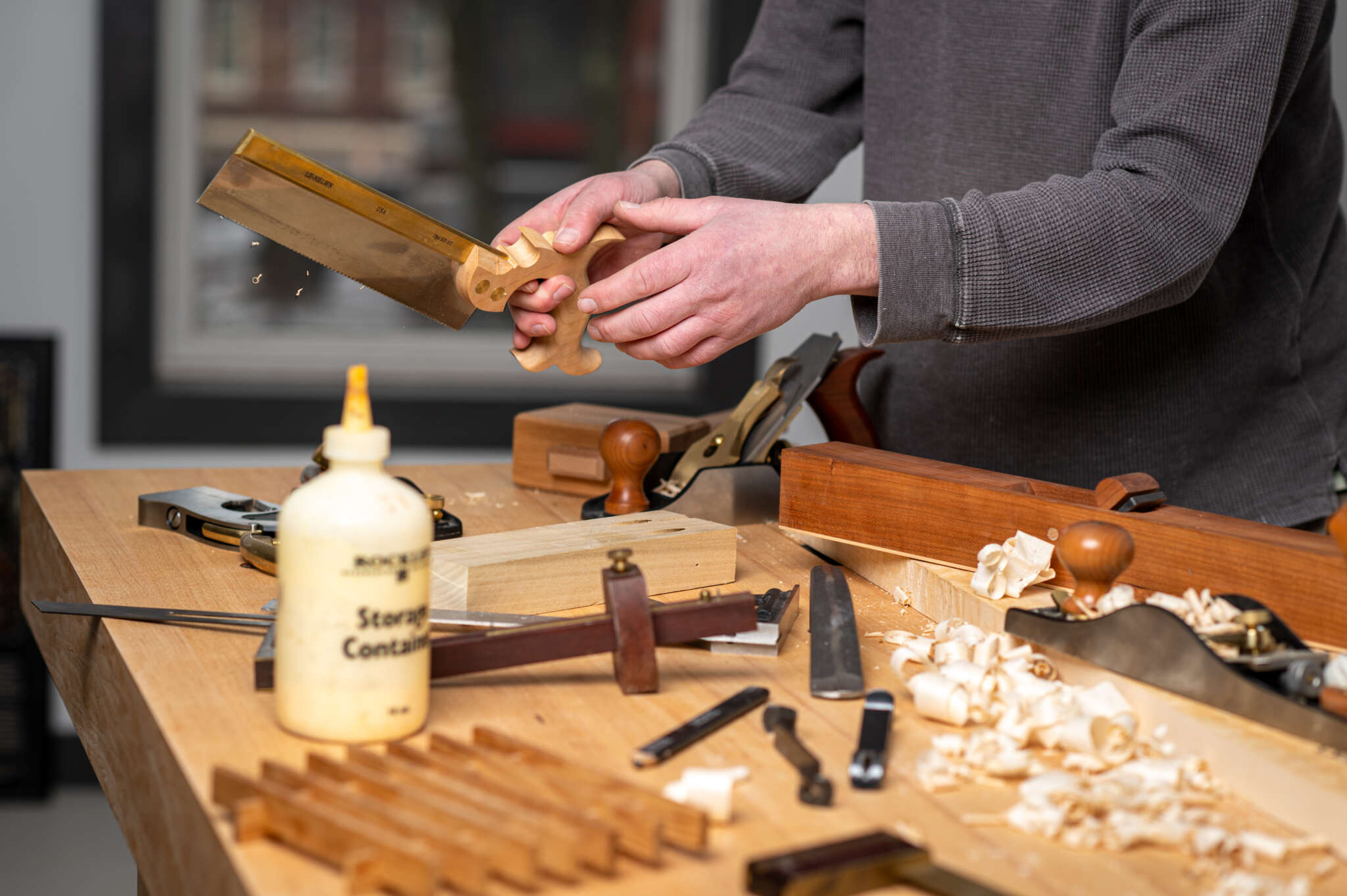If you’ve walked down Caroline Street in the last few weeks, you may have heard a peculiar sound. No, we’re not talking about the usual din of late-night revelers clinking glasses and singing karaoke—we’re talking about the noise made by a table saw, hammer drill or belt sander emanating from the former home of the Children’s Museum at Saratoga.
The source of such a racket would have been Saratoga Joinery, a nonprofit community woodworking studio that officially opened its doors at 69 Caroline Street on March 5. “Woodworking has been reserved primarily for folks who can afford to have a shop in their basement or in their garage,” says Tori Colarusso, Saratoga Joinery’s executive director. “We’re hoping to bring in people that maybe otherwise wouldn’t have any touch points to it. We are a really inclusive space, and we want to fill this place with people who look different than the typical woodworking guild spaces—women, BIPOC, queer communities.”
Saratoga Joinery is the brainchild of software engineer and serial entrepreneur John Haller, who in 2017 purchased a historic home in the Spa City. At the time a self-proclaimed “woodwork tinkerer,” Haller was able to understand and appreciate the handiwork his renovation crew was putting into his home. So much so that it ended up inspiring him to take his own hobby to the next level.

“I’ve always had a little workshop, but I bought the cheapest tools you could buy and had very little success with them,” he says. “As a hobbyist—just doing it for fun—there’s no way you can rationalize buying nice tools. So I looked around to see if there was a workshop that I could use. And there wasn’t.”
Haller’s entrepreneurial spirit kicked in, and after researching different makerspaces in the area, he began looking for a building in Saratoga that could house a community woodworking shop—an organization that could justify buying an $8,000 jointer, because there would be hundreds of people making use of it. When he came across the real estate listing for the old Children’s Museum, he felt it was meant to be. There was only one problem.
“After we bought the building and realized that this was going to happen,” Haller says, “my wife was like, ‘You know, you don’t really know anything about woodworking.’”
But to Haller, that fact was but a small bump in the road to making his community workshop concept a reality. He serendipitously landed a coveted spot in an intensive program at Maine’s Center for Furniture Craftsmanship, moving up there for the duration of the three-month course. And while the program taught him the skills necessary to run a woodworking studio, he also learned something else.
“The neat thing about the class was the effect of people working together,” Haller says. “Everyone would get excited about each other’s work. You’re trying harder, because the guy behind you is still working on his dovetails and they’re coming out really nice, so you make yours nicer. That’s what we’re trying to do here.”

For more advanced woodworkers, Saratoga Joinery offers memberships that cost $85 a month for unlimited access to the shop’s large machine room (with the aforementioned table saw and jointer), bench room (with hand tools and finishing equipment), gathering space (with couches and coffee), and lockers (so you don’t have to lug your project home and back again). There will always be two expert woodworkers on hand supervising the shop, answering questions and providing advice. Members will also have access to an annual bazaar at which they can sell their wares, as well as a summer picnic.
For everyone else, there are classes in which members and nonmembers alike can learn how to make a cutting board, carve a spoon, or fashion a pepper mill on a lathe. (More advanced classes like cabinet-making will also be offered.) “The hope is that someone will take an intro class, fall in love, and then become a member,” Colarusso says. Down the road, the Saratoga Joinery team hopes to provide workforce development and free community programs, and has already begun soliciting service project proposals from other nonprofits that might need a woodworking project done but don’t have the resources to pay for it.
“We’re big believers in woodworking being transformational,” Colarusso says. “Just having that tactile outlet—feeling the wood, smelling the wood, being with a group of like-minded folks working on a project—can be really beneficial.”
So, the next time you’re walking down Caroline Street and hear the whir of a ban saw, poke your head into Saratoga Joinery. You may just find yourself a lifelong hobby.


